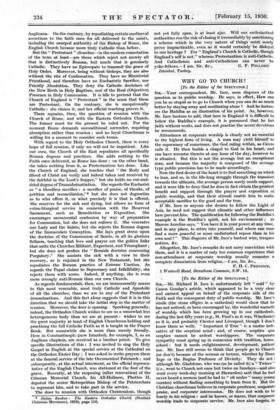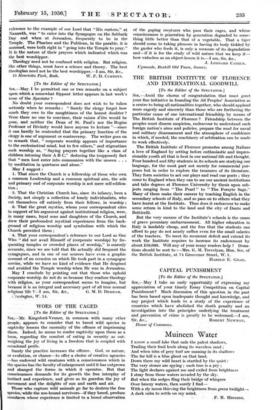[To the Editor of the SPECTATOR.] SIR,—Mr. Richard B. Ince
is unfortunately left "cold " by Canon Goudge's article, which appeared to be a very clear and earnest appeal on behalf of the corporate side of the Faith and the consequent duty of public worship. Mr. Ince's simile (the stone effigies in a cathedral) would show that he has not noticed, or been encouraged by, the wonderful warmth of worship which has been growing up in our cathedrals, during the last fifty years (e.g., St. Paul's as it was, Winchester as it is, and probably Chester and Liverpool, though I don't know them as well). " Important if True " is a motto indi- cative of the sceptical mind : and, of course, sceptics qua sceptics cannot be ardent worshippers. The corporate sympathy must spring up in connexion with tradition, home, school : but it needs enlightenment, development, patient use. Mr. Ince still seems to think that people go to Church (or don't) because of the sermon or lecture, whether by Dean Inge or the Regius Professor of Divinity. They do not : although Mr. Gladstone, who was (as he called it) a " Twicer " (i.e., went to Church not once but twice on Sundays—and also went every week-day morning at Hawarden) said that he had never heard a sermon (and he had to " sit under " many young curates) without finding something to learn from it. But the Christian churchman believes in corporate penitence, corporate praise, and corporate intercession. He does not wish to be lonely in his religion : and he knows, or learns, that corporate worship leads to corporate service. Mr. Ince also forgets, in reference to the example of our Lord that "His custom," at Nazareth, was " to enter into the Synagogue on. the Sabbath Day and when at Jerusalem, frequently to be in the Temple. The Pharisee and the Publican, in the parable, it is assumed, were both right in " going into the Temple to pray." It is the nature of their prayers which indicated which was the best worshipper.
Theology need not be confused with religion. But religion, like other things, must have a science and °theory. -The best theologian need not be the best worshipper.—I am, Sir, &c.,











































 Previous page
Previous page